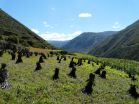INFORMATION:
The victimization quandry: To help victims we have to stop blaming them
But how do we do that?
2015-04-29
(Press-News.org) (NEWARK, NJ) - April 29, 2014 - A woman is brutally assaulted, but rather than receiving the sympathy she deserves, she is blamed. If she had dressed differently or acted differently, or made wiser choices, others say, she would have been spared her ordeal. For victims, this "victim blaming" is profoundly hurtful, and can lead to secondary victimization.
Psychologists have long realized that blaming victims is a defense mechanism that helps blamers feel better about the world, and see it as fair and just. But ways to prevent victim blaming have been elusive -- until now.
A team of researchers, led by a Rutgers University-Newark (RU-N) psychology professor, Dr. Kent Harber, has found a surprisingly direct way to spare victims the unwarranted social insult to their personal injuries: Emotional disclosure. They found that that witnesses blame victims much less if they express, in writing, the disturbing thoughts and feelings that victims' ordeals arouse in them. However, witnesses who suppress these feelings, and who keep their distress locked inside, do blame victims.
The research team -- Harber, Peter Podolski of the New Jersey Institute of Technology, and Christian H. Williams of RU-N's psychology department - explains its findings in the article, "Emotional Disclosure and Victim-Blaming," to be published in the May 2015 edition of the journal Emotion.
"Victim-blaming is pervasive," says Harber. "It is experienced by sufferers of deadly illnesses, crippling accidents, natural disasters, physical assault, economic hardship; indeed, nearly all bad events. For victims, this blaming is profoundly hurtful and it can wound as deeply as the injury itself."
Previous research has explained why observers blame victims, notes Harber. "It helps blamers retain faith in a just, fair, and controllable world where bad things mainly happen to bad (or inept, or unwise) people."
Seeking a way to reduce victim blaming, Harber, Podolski and Williams conducted laboratory experiments using college students who viewed one of two movie clips. Some watched scenes from the 1988 film The Accused, which showed the violent sexual assault of a woman in a bar. Others watched a clip of former British Prime Minister Margaret Thatcher in heated economic debates with adversarial male political leaders. Thatcher, though embattled, was not a victim.
After the viewings, audience members were asked to write about the film they had seen. "Suppressors" could only provide factual, objective observations; they were not allowed to disclose their feelings. "Disclosers" were permitted to freely express their emotional reactions. Disclosing and suppressing had no effect on attitudes toward Thatcher, the non-victim. Results were markedly different for those watching the rape scene from The Accused. Suppressors, who could not reveal their emotions about the rape victim, were more likely to blame her. Disclosers, in contrast, blamed the victim much less. And the more words the disclosers wrote, and the more distress they conveyed, the less they blamed the victim.
"This first study confirmed that disclosure reduces victim blaming, but it left a somewhat troubling possibility unanswered," notes Harber. "What if disclosure, by alleviating the emotions that trigger blaming, tempers blaming of assailants as well as assault victims? If so, disclosure would absolve victimizers as well as victims."
The research team then conducted a second study which showed that this was not the case. This research methodology was nearly identical to the first study but with one exception: viewers also evaluated the adversarial men in the movies they viewed: Thatcher's opponents, for subjects who viewed the Thatcher documentary, and the rape victim's attackers, for those who viewed The Accused. Results showed that disclosure only reduced blaming for the rape victim; it had no effect on attitudes towards her assailants, who were condemned equally by disclosers and suppressors. As in the first study, suppression led to blaming of the rape victim. In fact, the victim was faulted nearly as much as were her attackers. Disclosing and suppressing had no effect on Thatcher's adversaries, as expected.
According to Harber, the combined studies "suggest that people can best help victims by first addressing their own emotional needs."
Harber says this research "has already raised interest among law scholars, because of its implications for juries. Jurors are often prohibited from discussing cases until final deliberation. Our research suggests that this forced suppression might affect jurors' attitudes toward victim/plaintiffs." The research might also inform rape counseling, says Harber. By encouraging survivors' families and friends to disclose rather than suppress their emotions--perhaps to trained therapists--survivors might be spared inadvertent blaming from those closest to them.
ELSE PRESS RELEASES FROM THIS DATE:
Strong evidence for coronal heating theory presented at 2015 TESS meeting
2015-04-29
The sun's surface is blisteringly hot at 10,340 degrees Fahrenheit -- but its atmosphere is another 300 times hotter. This has led to an enduring mystery for those who study the sun: What heats the atmosphere to such extreme temperatures? Normally when you move away from a hot source the environment gets cooler, but some mechanism is clearly at work in the solar atmosphere, the corona, to bring the temperatures up so high.
Clear evidence now suggests that the heating mechanism depends on regular, but intermittent explosive bursts of heat, rather than on continuous gradual ...
UM study: Oil and gas development transforms landscapes
2015-04-29
MISSOULA - Improved drilling technologies and energy demand have resulted in the large-scale expansion of oil and gas development, with 50,000 new wells drilled per year recently in central North America. Locations such as the Bakken, Eagle Ford and the Marcellus Shale are now commonplace, and drilling activity frequently makes news.
But what are the ecological consequences of this accelerated drilling activity? Researchers at the University of Montana have conducted the first-ever broad-scale scientific assessment of how oil and gas development transforms landscapes ...
Study finds ancient clam beaches not so natural
2015-04-29
Casting a large interdisciplinary research net has helped Simon Fraser University archaeologist Dana Lepofsky and 10 collaborators dig deeper into their findings about ancient clam gardens in the Pacific Northwest to formulate new perspectives.
Lepofsky's research team has discovered that Northwest Coast Indigenous people didn't make their living just by gathering the natural ocean's bounty. Rather, from Alaska to Washington, they were farmers who cultivated productive clam gardens to ensure abundant and sustainable clam harvests.
In its new paper published by American ...
Soldier beetle went a-courtin'
2015-04-29
Being bigger and bolder holds various benefits for male soldier beetles. They enjoy higher rates of successful courtship and more often land a larger, more fertile mate. These are some of the findings of a study led by Denson McLain of the Georgia Southern University in the US, published in Springer's journal Behavioral Ecology and Sociobiology.
The goldenrod soldier beetle or Pennsylvanian leatherwing (Chauliognathus pennsylvanicus) is native to Northern America. During its peak reproductive season, between September to early October, it only mates once a day. This normally ...
DNA suggests all early eskimos migrated from Alaska's North Slope
2015-04-29
CHICAGO -- Genetic testing of Iñupiat people currently living in Alaska's North Slope is helping Northwestern University scientists fill in the blanks on questions about the migration patterns and ancestral pool of the people who populated the North American Arctic over the last 5,000 years.
"This is the first evidence that genetically ties all of the Iñupiat and Inuit populations from Alaska, Canada and Greenland back to the Alaskan North Slope," said Northwestern's M. Geoffrey Hayes, senior author of the new study to be published April 29, 2015, in the American ...
Closing the Case on an Ancient Archeological Mystery
2015-04-29
PULLMAN, Wash.--Climate change may be responsible for the abrupt collapse of civilization on the fringes of the Tibetan Plateau around 2000 B.C.
WSU archaeologist Jade D'Alpoim Guedes and an international team of researchers found that cooling global temperatures at the end of the Holocene Climatic Optimum, a 4,000 year period of warm weather, would have made it impossible for ancient people on the Tibetan Plateau to cultivate millet, their primary food source.
Guedes' team's research recently was published online in the Proceedings of the National Academy of Sciences. ...
Improving the effect of HIV drugs by the use of a vaccine
2015-04-29
A vaccine containing a protein necessary for virus replication can boost an HIV-infected patient's immune system, according to clinical research published in the open access journal Retrovirology. This boost can result in increased effectiveness of antiretroviral drugs.
When people are first diagnosed with HIV they are put on antiretroviral drugs, also known as highly active antiretroviral therapy (HAART). These drugs can stop the virus reproducing almost completely. When taking HAART, however, it is known that the virus can still replicate at low levels and accumulate ...
Pneumonectomy or lobectomy?
2015-04-29
For patients in the early stage of non-small cell lung cancer, surgical resection yields optimal outcomes. Prior investigations have shown that different resection procedures have very different outcomes, with pneumonectomy associated with three-fold higher mortality than other resection types. While it is understandable that pathological and physiological factors influence a surgeon's choice of surgery for a particular patient, the results presented in this study suggest that physician discomfort with the operative complexities of a procedure may lead to selection of a ...
Simple, active intervention program after major thoracic surgery reduces ER visits and saves money
2015-04-29
Hospital readmission rates after major thoracic surgery can run as high as 10-17%. Alarmingly, readmission after pulmonary resection for lung cancer has been associated with worse outcomes, including higher mortality. Thus, reducing readmissions after thoracic surgery can both save lives and reduce healthcare costs. Studies in internal medicine and cardiology have shown that programs that improve the transition from hospital to post-discharge care can be effective in decreasing emergency room visits and re-hospitalization. This study from McMaster University describes for ...
Chronic obstructive pulmonary disease increases the risk of sudden cardiac death
2015-04-29
People suffering from the common lung disease, chronic obstructive pulmonary disease (COPD), have an increased risk of sudden cardiac death (SCD), according to new research published online today (Wednesday) in the European Heart Journal [1].
When compared with people of the same age and sex who do not have the disease, those with COPD have a 34% increased risk of SCD overall, but their risk almost doubles more than five years after first being diagnosed with COPD. In COPD patients who have frequent exacerbations (sudden worsening of their symptoms, such as shortness ...
LAST 30 PRESS RELEASES:
How sleep disruption impairs social memory: Oxytocin circuits reveal mechanisms and therapeutic opportunities
Natural compound from pomegranate leaves disrupts disease-causing amyloid
A depression treatment that once took eight weeks may work just as well in one
New study calls for personalized, tiered approach to postpartum care
The hidden breath of cities: Why we need to look closer at public fountains
Rewetting peatlands could unlock more effective carbon removal using biochar
Microplastics discovered in prostate tumors
ACES marks 150 years of the Morrow Plots, our nation's oldest research field
Physicists open door to future, hyper-efficient ‘orbitronic’ devices
$80 million supports research into exceptional longevity
Why the planet doesn’t dry out together: scientists solve a global climate puzzle
Global greening: The Earth’s green wave is shifting
You don't need to be very altruistic to stop an epidemic
Signs on Stone Age objects: Precursor to written language dates back 40,000 years
MIT study reveals climatic fingerprints of wildfires and volcanic eruptions
A shift from the sandlot to the travel team for youth sports
Hair-width LEDs could replace lasers
The hidden infections that refuse to go away: how household practices can stop deadly diseases
Ochsner MD Anderson uses groundbreaking TIL therapy to treat advanced melanoma in adults
A heatshield for ‘never-wet’ surfaces: Rice engineering team repels even near-boiling water with low-cost, scalable coating
Skills from being a birder may change—and benefit—your brain
Waterloo researchers turning plastic waste into vinegar
Measuring the expansion of the universe with cosmic fireworks
How horses whinny: Whistling while singing
US newborn hepatitis B virus vaccination rates
When influencers raise a glass, young viewers want to join them
Exposure to alcohol-related social media content and desire to drink among young adults
Access to dialysis facilities in socioeconomically advantaged and disadvantaged communities
Dietary patterns and indicators of cognitive function
New study shows dry powder inhalers can improve patient outcomes and lower environmental impact
[Press-News.org] The victimization quandry: To help victims we have to stop blaming themBut how do we do that?


